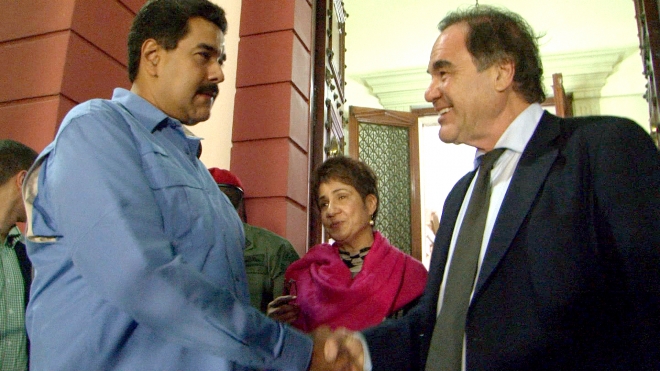
19
Venezuela – Update
I went to Venezuela this last week for interviews with the new leadership. Not for a bio pic, as was reported by anti-Chávez press, but for a small documentary film for South American television/internet on the first anniversary of Hugo’s death.

I was quite surprised at how strongly devoted the new leaders are to the principles of Socialist change in their country. I’d worried that Hugo Chávez was trying to do too much himself and had not properly prepared these men and women for the job after. Certainly, he never thought he’d die so young at 58, or so suddenly and brutally from a rare and aggressive cancer.
The new leaders are undergoing tremendous challenges from their highly vociferous right-wing opponents, who, like some of our Republicans, never give up their maniac accusations and attempts at destabilization—and, far more subtly, from the American CIA and, less subtly, from its subservient American media. (When have you ever seen one positive story in 13 years on Venezuela in the MSM?) When I asked how many CIA people are working in Venezuela, the intelligence chief mentioned a precise number above 50; they seem to have a good handle on this penetration. These CIA people are for the most part undercover business contacts who participate, along with the right-wing fanatics, in sabotage against the economy.
Remember that in August 2012, two months before Chávez’s October re-election, 48 people were killed in an oil refinery explosion at PDVSA, the state-owned oil company, in an act of sabotage.

When Chávez won his re-election to a fourth term over the U.S.-backed candidate, Henrique Capriles, in October 2012, he was a dying man. He’d been sick since mid-2011. He’d be dead by March 2013. The U.S. tried its hardest to defeat him in that election. Money was given to opposition groups in the same ways the old USAID network/CIA functioned, but now with U.S. agencies expelled, we were employing NGOs. The U.S. was further surprised when Vice President Nicolás Maduro came out ahead over Capriles in a special election in April after Chávez’s death.
It’s clear from talking to President Maduro and his cabinet that nothing has changed. John Kerry recently did the bear-hug routine with Venezuela’s foreign minster, Elías Jaua, saying there would be better relations between them and us, but Venezuela should not, by any means, offer asylum to Edward Snowden. Venezuela did consider this ‘bribe,’ which had significant economic advantages for them, and weighed that appeal against its principles. As you know, Snowden was invited to apply for asylum. Among the documents that Snowden released were several on the U.S.’s destabilization of Venezuela.

I’m writing to remind those who care that the secret war still goes on. It’s a war sought and fought by one side, the United States, against a smaller country. Nothing has changed since the Monroe Doctrine. If anything, it’s gotten uglier, more murderous, and technically-oriented.
Chávez, who was a bull of a man with enormous energy, from the moment he first took sick in June 2011 with an abscessed tumor in his leg, always suspected that this was not a natural disease.  Several of his closest confidants also expressed to me similar suspicions as to the origins of this cancer. Nicolás Maduro and his leadership are not pushovers. This is going to be a dangerous period, as it always has been for Venezuela since the Chávez Revolution. But my heart goes out to them. They are fighters. They’re not going to give up—even if their first real President was suspiciously taken from them in this war which never seems to never end—in North America’s “backyard.”
Several of his closest confidants also expressed to me similar suspicions as to the origins of this cancer. Nicolás Maduro and his leadership are not pushovers. This is going to be a dangerous period, as it always has been for Venezuela since the Chávez Revolution. But my heart goes out to them. They are fighters. They’re not going to give up—even if their first real President was suspiciously taken from them in this war which never seems to never end—in North America’s “backyard.”














